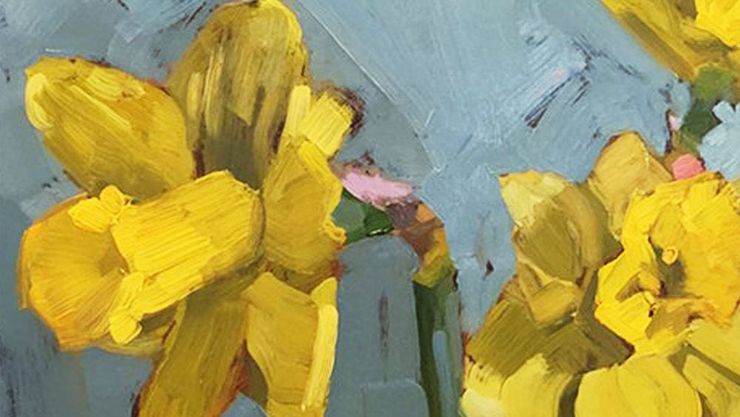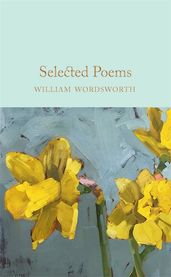Our favourite William Wordsworth poems
This year we celebrate the 252nd anniversary of William Wordsworth’s birthday. Read on to find out why his work is still relevant today, and for our pick of his best poems.

William Wordsworth rose to fame in the 18th century for his radical and direct approach to poetry. Casting aside outdated literary tropes, he wrote poems that reflected everyday speech, becoming one of the first modern poets to connect to readers in their own language.
Drawing inspiration from his life in the beautiful Lake District, his poems perfectly capture the healing powers of the natural world and provide an unrivalled antidote to the busy lives of our era. Here, we’ve picked some of our favourite William Wordsworth poems, from ‘I Wandered Lonely as a Cloud’ to ‘The World is Too Much With Us’.
Discover our edit of the best poetry books.
I Wandered Lonely as a Cloud
I wandered lonely as a cloud
That floats on high o'er vales and hills,
When all at once I saw a crowd,
A host, of golden daffodils;
Beside the lake, beneath the trees,
Fluttering and dancing in the breeze.
Continuous as the stars that shine
And twinkle on the milky way,
They stretched in never-ending line
Along the margin of a bay:
Ten thousand saw I at a glance,
Tossing their heads in sprightly dance.
The waves beside them danced; but they
Out-did the sparkling waves in glee:
A poet could not but be gay,
In such a jocund company:
I gazed—and gazed—but little thought
What wealth the show to me had brought:
For oft, when on my couch I lie
In vacant or in pensive mood,
They flash upon that inward eye
Which is the bliss of solitude;
And then my heart with pleasure fills,
And dances with the daffodils.
To the Skylark
Ethereal minstrel! pilgrim of the sky!
Dost thou despise the earth where cares abound?
Or, while the wings aspire, are heart and eye
Both with thy nest upon the dewy ground?
Thy nest which thou canst drop into at will,
Those quivering wings composed, that music still!
Leave to the nightingale her shady wood;
A privacy of glorious light is thine;
Whence thou dost pour upon the world a flood
Of harmony, with instinct more divine;
Type of the wise who soar, but never roam;
True to the kindred points of Heaven and Home!
from Lines Composed a Few Miles above Tintern Abbey
on Revisiting the Banks of the Wye during a Tour. July 13, 1798
Five years have past; five summers, with the length
Of five long winters! and again I hear
These waters, rolling from their mountain-springs
With a soft inland murmur.—Once again
Do I behold these steep and lofty cliffs,
That on a wild secluded scene impress
Thoughts of more deep seclusion; and connect
The landscape with the quiet of the sky.
The day is come when I again repose
Here, under this dark sycamore, and view
These plots of cottage-ground, these orchard-tufts,
Which at this season, with their unripe fruits,
Are clad in one green hue, and lose themselves
'Mid groves and copses. Once again I see
These hedge-rows, hardly hedge-rows, little lines
Of sportive wood run wild: these pastoral farms,
Green to the very door; and wreaths of smoke
Sent up, in silence, from among the trees!
With some uncertain notice, as might seem
Of vagrant dwellers in the houseless woods,
Or of some Hermit's cave, where by his fire
The Hermit sits alone.
My Heart Leaps Up
My heart leaps up when I behold
A rainbow in the sky:
So was it when my life began;
So is it now I am a man;
So be it when I shall grow old,
Or let me die!
The Child is father of the Man;
And I could wish my days to be
Bound each to each by natural piety.
A Slumber did my Spirit Seal
A slumber did my spirit seal;
I had no human fears:
She seemed a thing that could not feel
The touch of earthly years.
No motion has she now, no force;
She neither hears nor sees;
Rolled round in earth's diurnal course,
With rocks, and stones, and trees.
It is a Beauteous Evening, Calm and Free
It is a beauteous evening, calm and free,
The holy time is quiet as a Nun
Breathless with adoration; the broad sun
Is sinking down in its tranquility;
The gentleness of heaven broods o'er the Sea;
Listen! the mighty Being is awake,
And doth with his eternal motion make
A sound like thunder—everlastingly.
Dear child! dear Girl! that walkest with me here,
If thou appear untouched by solemn thought,
Thy nature is not therefore less divine:
Thou liest in Abraham's bosom all the year;
And worshipp'st at the Temple's inner shrine,
God being with thee when we know it not.
The World Is Too Much With Us
The world is too much with us; late and soon,
Getting and spending, we lay waste our powers;—
Little we see in Nature that is ours;
We have given our hearts away, a sordid boon!
This Sea that bares her bosom to the moon;
The winds that will be howling at all hours,
And are up-gathered now like sleeping flowers;
For this, for everything, we are out of tune;
It moves us not. Great God! I’d rather be
A Pagan suckled in a creed outworn;
So might I, standing on this pleasant lea,
Have glimpses that would make me less forlorn;
Have sight of Proteus rising from the sea;
Or hear old Triton blow his wreathèd horn.
The Sun Has Long Been Set
The sun has long been set,
The stars are out by twos and threes,
The little birds are piping yet
Among the bushes and trees;
There's a cuckoo, and one or two thrushes,
And a far-off wind that rushes,
And a sound of water that gushes,
And the cuckoo's sovereign cry
Fills all the hollow of the sky.
Who would "go parading"
In London, "and masquerading,"
On such a night of June
With that beautiful soft half-moon,
And all these innocent blisses?
On such a night as this is!
Selected Poems
by William Wordsworth
Selected Poems is a collection of Wordsworth’s most acclaimed and influential works, from his best known poem, ‘I Wandered Lonely as a Cloud’, to an extract from his magnum opus The Prelude. A pioneering Romantic poet, Wiliam Wordsworth addressed the natural world and human emotion, and revolutionized poetry.
Explore more of the classic literature that has stood the test of time.



